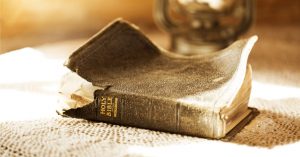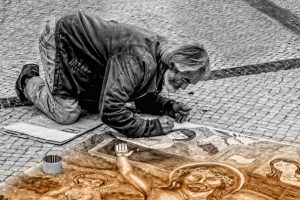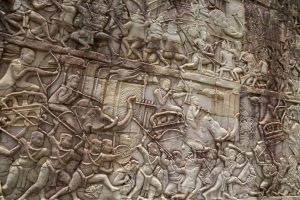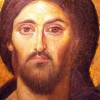Luke 13:10-17
Now He was teaching in one of the synagogues on the Sabbath. And behold, there was a woman who had a spirit of infirmity eighteen years, and was bent over and could in no way raise herself up. But when Jesus saw her, He called her to Him and said to her, “Woman, you are loosed from your infirmity.” And He laid His hands on her, and immediately she was made straight, and glorified God. But the ruler of the synagogue answered with indignation, because Jesus had healed on the Sabbath; and he said to the crowd, “There are six days on which men ought to work; therefore come and be healed on them, and not on the Sabbath day.” The Lord then answered him and said, “Hypocrite! Does not each one of you on the Sabbath loose his ox or donkey from the stall, and lead it away to water it? So ought not this woman, being a daughter of Abraham, whom Satan has bound-think of it-for eighteen years, be loosed from this bond on the Sabbath?And when He said these things, all His adversaries were put to shame; and all the multitude rejoiced for all the glorious things that were done by Him.
In the Name of the Father, and of the Son, and of the Holy Spirit.
Very often we are carried away by rules, and regulations, and that’s very much the case in today’s Gospel reading, because this woman was healed of her illness on the Sabbath Day. (In this particular case it was not simply an illness, but it also had to do with a demonic oppression.) A very important thing to remember is that underlying everything in the relationship with the Lord, is this saying: “The Sabbath was made for man, not man for the Sabbath” (Mark 2:27). The Sabbath Day, the day of rest, was given to us as a blessing, a day on which we could rest from doing all sorts of work, and instead, devote ourselves to worshipping God. That should take precedence over everything.
However, the worship of God should not be unreasonable. Human beings like to take liberties, of course. That old saying: “Give them an inch, and they will take a yard or even a mile” applies to all human beings. So when it is understood by human beings very often that there is freedom to do whatever their heart moves them to do on the Sabbath Day, the tendency is to do whatever you feel like on the Sabbath Day. People would naturally begin to do all sorts of things that are not exactly restful, and make excuses for not attending worship services. Those who were in charge of the congregations in those pre-Christian days, like people still do today, said: Well, since people are getting all unruly, we have to regulate life, and put things in order. Therefore we are going to have to make extra rules to make sure that people don’t do any work at any time on the Sabbath Day.
The rules that they came up with became almost ridiculous. If you had been doing some sewing some other day, and if you accidentally on the Sabbath put on a coat or a cloak that had a needle in it, and you got caught by someone, you would be accused of working on the Sabbath Day, and you would be given penalties because you were carrying a needle in your cloak. This doesn’t work, of course, because we get ridiculous in our attempt to protect something that is holy.
The Sabbath Day is holy. Society, sad to say, used to keep the Lord’s Day, the Christian Sabbath. We didn’t lose Saturday as the Sabbath, but we added Sunday in particular, the day of the Lord’s Resurrection. On this day, we worship the Lord, attend church, pay attention to the Lord, and put the Lord first. When I was a child, of course, nothing was open on Sunday anywhere in Canada. All shops were closed, restaurants maybe were a little bit open, but not much at all happened on Sunday. I was quite surprised when I was in Thessalonica a couple of weeks ago – it’s still the case there. I couldn’t believe it. On Sunday, after church, nothing is open at all, and such restaurants that are open, are already closing at 6 o’clock. Everyone is taking a rest on Sunday in Thessalonica, and I’m told that it’s the case in all of Greece.
Here, in Canada, this kind of liberty that we began to take, has gone to extremes. In Canada, all people do now is work, work, work every single, solitary day. No day is any different; money is money; business is business – work, work, work. There is no day off. We have no day off at all in Canada. This is where we are getting ridiculous in the opposite direction. However, making federal laws to stop us working on Sunday is not going to get us anywhere because we always rebel against laws; we always try to get around those laws one way or another; we don’t like being regulated.
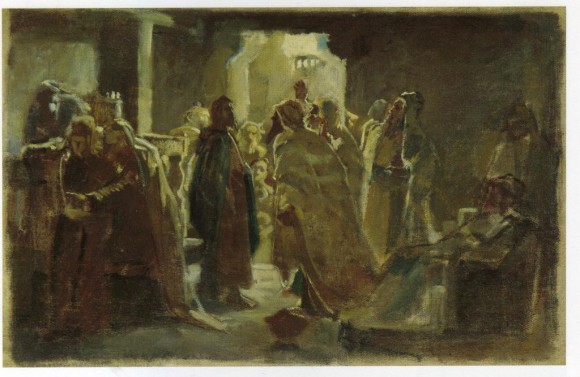
Christ in the synagogue. Nikolay Gay
If things are going to change, we, ourselves, have to do something in our hearts in the first place. We have to let the Lord guide, and govern our hearts, and direct us correctly. Worshipping the Lord, being in His presence, being together in the House of the Lord, at the Table of the Lord, on the Day of the Lord is the most important thing for us no matter what else seems to be important. We cannot survive the rest of the week, really, without coming here, being here at the Table of the Lord, among the people of the Lord, where He feeds us with Himself, with His life, so that we have strength to continue to follow the right way, with hearts that are open to the Lord, and able to hear everything by the Grace of the Holy Spirit.
This woman today is bent over. Nowadays, because of Canadian medicine, we seldom see a man or a woman all bent over. This, of course, is a symptom of osteoporosis. But, in this particular woman’s case, it seems not to have been so simple as osteoporosis because the Lord knows what He is talking about. If He had said she was just ill, she would probably have had osteoporosis. Something else was burdening her because the Lord said that she was bound by Satan for these eighteen years. So in her case it was not osteoporosis – something had happened to her spiritually that affected her physically, and bent her all over. The Lord, who everywhere, and at all times, is setting people free, approaches her, and sets her free just like that, and she stands up straight immediately.
It’s important for us to remember this, because we, ourselves, are often burdened by sin, by guilt, by all sorts of other things, by too much paying attention to evil thoughts, and so forth. Maybe our bodies are not all bent over, but our hearts are all bent over, and darkened. It’s important for us to remember that the Lord is the same Lord always – He is not different to this woman than He is to us. He cares about this woman that we just heard about; He cares about us in the same way. As He sets this woman free from her oppression by the devil, He does set you, and me free also from oppression by the devil, and from enslavement to our sins, one sort or another. He sets us free by His love. He is the One who gives us life; He is the One who turns us about, cleans us up, washes us, straightens us up, gives us the strength to do what we have to do, as healthy persons, as healthy Christians.
When we are hearing about spiritual warfare, one way or another, we are often speaking about ourselves as some kind of Star Wars warrior or something. Very often images pass through the mind (especially today when the Apostle is talking about putting on the whole armour). It’s not so simple as this because the spiritual Fathers, and Mothers, who have experience, understand, and they repeat frequently, that it is not the way. It is never a safe way to start trying to battle with devils, and evil straight on ourselves. It’s not as if we can put on some kind of impenetrable armour, and be like Frodo, or some elf in a Tolkien story. Those kinds of weapons are fantastic weapons, and those kinds of protections are fantastic, also, when it comes to dealing with good, and evil. In this struggle between good, and evil in our hearts, and in our lives, there is no bullet-proof vest that we can put on as such. The only protection you or I can have is the protection of the Saviour, Himself. The armour that we put on is Christ. If there is going to be the overcoming of evil in our lives, it is going to be done by Christ.
I will give you an example of this. This is an account that I read a long time ago about a man, who around 1907 had lived a very bad life in Russia, and never went to church, although he had been when he was a child. In those days, there were plenty of people who didn’t go to church. He had lived some kind of evil, and dissolute life (as Canadians live now, by and large). This man contracted pneumonia. A hundred years ago, pneumonia was very, very serious, and it was easy to die from it, even if you were young. He was in the hospital, and he was lying in this ward, with some kind of terrible fever, and so forth.
The doctors, and nurses were coming, and going attending to him, and at one stage it was so bad that he came out of himself, and was looking down upon himself. He was seeing the doctors standing there, and the nurses, and they said: There’s no hope for him. There’s nothing we can do. When he heard that, he felt himself being taken away by someone nearby. He went into this darkness, and then began to go to some sort of light. You’ve heard or read perhaps of these near-death experiences. This man didn’t have a near-death experience; he had a complete death experience. He was being taken by this angel towards the light that he began to see. As he was going in this direction towards the light, there began to be dark creatures approaching him. These nasty, distorted creatures began to accuse the guardian angel (as he understood it to be, afterwards) saying: This man belongs to us because everything about his life has been belonging to us – you have no right to take him. They argued like this, and the man was “scared to death” (or horrified, to put it in other terms). The angel carried him on farther, and the attacks became more and more intense, and severe, and all true (they weren’t lying about what he had done in his life).
He was really so scared that he didn’t know what to do. Yet the angel was still there; and suddenly he remembered having been in church with his grandmother when he was a child, and only one prayer that she said in church, or with him at home, came back to his memory, and that was: “Most holy Theotokos, save us”. So he said it. Immediately some kind of fog surrounded him, and he couldn’t see those dark creatures or hear their accusations. He was surprised, so he repeated the prayer. The more he repeated this prayer, the more the fog became thick, and he could hear less and less the accusations; his fear became less, and he became more calm. He continued to repeat this prayer.
Eventually they came out of the fog, and there were no demons around, no ugly things, only the light, to which he approached, and in the presence of which he felt extremely warm, at peace, and full of joy. As he approached very close to this light, there was a voice that said: Not ready! Immediately he went into reverse. He returned to the hospital where his body was. However, by this time, his body was already in the morgue of the hospital. A hundred years ago, in an Orthodox country, it was not like the morgue of a hospital here today where they put you in some kind of a drawer in a cooler. His body was on the table, and the psalm-reader was reading the Psalms, which was his job in an Orthodox hospital in an Orthodox country. This is the Orthodox way when someone dies – someone stays in the presence of the body until the family comes to collect it. In traditional culture, if the body is at home, someone begins to read the Psalms over the body, and stays in the presence of the body until the time comes for washing the body, dressing, and preparing for burial, and taking the body to the church. The man came back to himself, and apparently the return to his body was with a certain amount of power, and demonstrativeness as he began to breathe, and flail about, and come to consciousness. The psalm-reader fainted. (Wouldn’t you, in such circumstances?)
This man wrote this pamphlet saying that these were his experiences, because he wanted other people to know what his life was like, and how the Lord touched him. He wanted other people to know that the Lord does love them, and that they can turn from their darkness, and come to their senses, like the prodigal son. They can come to life, real life. This man did apparently live this real life afterwards. This is the armour of Christ – turning to the Lord.
In this case, the man asked for the help of the Mother of God. It’s the same thing as asking for the Lord’s help, because she immediately prays to her Son for whoever turns to her, just like you see in this icon. The Mother of God is always pointing to her Son; her Son is blessing. This is how, in some form or another, we always see this combination. The Mother of God is always referring to her Son; she is always in perfect communion of love with her Son. She knows His will; He tells her what to do. She prays to Him, asking on our behalf; He blesses. This is what happened in this man’s case, and that’s what happens in our case, too. We can turn to her – we can ask her as a friend, as a mother, to pray for us, and to help us. What happened to this man can happen to us, too. The love of the Lord comes to us through her, and through her prayers. He, Himself, is the Actor in this case, but she is the extra agent of love, as we sometimes are, too. The Lord does hear your, and my intercessions, similarly, as agents of His love.
When we are in the middle of temptation, and we are being attacked by evil, whether it’s one kind of a struggle or another in our lives, it’s important for us to turn to the Lord, and say: Help! This is exactly what “putting on the armour” is all about. It’s not that we are going to start sword-fighting. This is oriental-style martial arts technique: when an attack comes, we sidestep, allow it to pass by, and say: “Help” to the Lord.
It’s the Lord who puts on the protection, and stops the attack Himself. It’s not we who do anything; because if we think it is our doing, it becomes “me, me, me.” As soon as we say “me, me, me,” it’s all finished – Big Red has won. It always has to be Jesus Christ, who is our Saviour. He is the only Saviour. I cannot save me; I cannot save anything. The Saviour does all the saving. He is the Protector. Let us glorify our Saviour, together with His Father, who is from everlasting, and His all-holy, good, and life-creating Spirit, now, and ever, and unto the ages of ages. Amen.
Source: Archdiocese of Canada of the Orthodox Church in America












